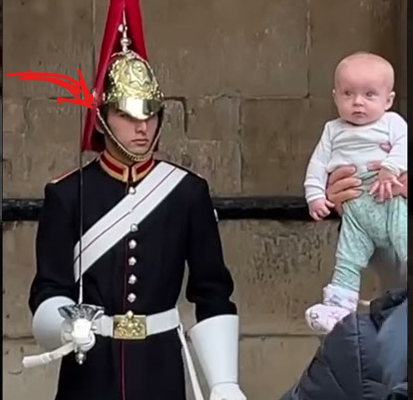The summer air buzzed with the anticipation of the Changing of the Guard ceremony at Buckingham Palace. Tourists jostled for position, cameras flashing, while a young family watched from a nearby bench. Their baby, nestled securely in a sling, gurgled contentedly, oblivious to the spectacle unfolding before them.
The procession began, the guards marching with impeccable precision, their faces stern and their eyes fixed ahead. As they passed, the baby, captivated by the vibrant scarlet tunics and towering bearskins, let out a series of delighted squeals. The parents chuckled, amused by their child’s fascination.
Then, something unexpected happened. The last guard in line, a towering figure with a weathered face, paused. His gaze, usually trained on the ground, shifted towards the baby. A hint of a smile played on his lips, a rare crack in the mask of impassivity. He slowed his pace slightly, acknowledging the baby’s joyful noises with a gentle nod of his head.
A collective gasp echoed through the onlookers as the guard continued his march, the subtle gesture shattering the illusion of unwavering stoicism. The parents exchanged surprised glances, their hearts swelling with warmth. The baby, sensing the shift in the guard’s demeanor, cooed in response, seemingly captivated by the unexpected interaction.
Video



